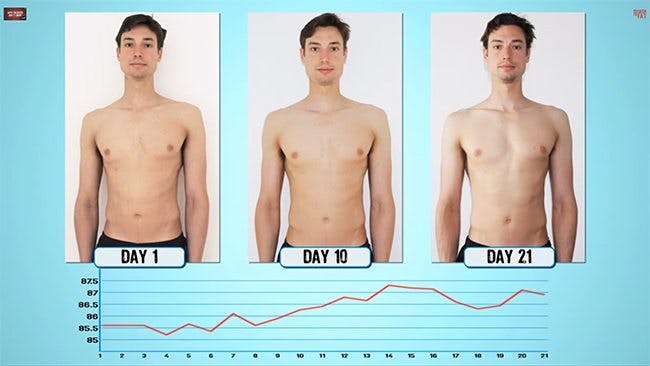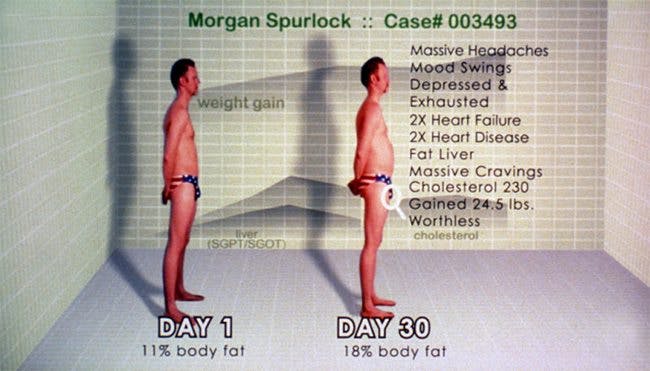What happens if you eat 5,800 calories daily on an LCHF diet?

What happens if you “overeat” on an LCHF diet? It’s a common question and here’s one possible answer.
The young man Sam Feltham has done a three-week experiment, where he’s been eating enormous amounts of LCHF-food. On average 5794 calories daily of which “only” 10% as carbohydrates (menu).
According to over-simplified calorie counting, energy expenditure isn’t affected by what you eat. All excess calories you eat will then lead to weight gain. If this were true Feltham would have gained 16.5 lbs (7.5 kg) during the three weeks, but in reality he only gained 3.5 lbs (1.7 kg).
Here’s the explanation:
Theory and reality
There’s a difference between calculated energy surplus and real energy surplus. Apparently Feltham didn’t have a large real energy surplus, as he didn’t gain more weight.
The most likely explanation to me is that his energy expenditure increased substantially during the experiment. Maybe there are other explanations? Perhaps his body also adapted by not taking up all the nutrients he ate?
I’m not surprised by the results. If you starve long term you don’t lose as much weight as simple calorie counting predicts. The body will decrease the metabolic rate. If you overeat you don’t gain that much weight. The body adapts and tries to maintain an appropriate fat mass.
Some find it hard to believe in Felthams results and suggest that he’s lying. I don’t think so. There are several previous reports from people who have done similar experiments – stuffed themselves with copious amounts of LCHF-food. Weight gain tends to be small or non-existent, so Feltham’s results seem to be typical.
Hormones
The above applies as long as the body’s hormonal regulation is balanced. Eating large amounts of bad carbohydrates may interfere with hormonal balance. Large amounts of the fat-storing hormone insulin are then produced.
So what happens when you overeat bad carbohydrates to the extreme? A good example is the movie “Supersize Me”.
Morgan Spurlock did a similar experiment: he ate 5,000 calories daily for 30 days – at McDonalds. The difference was that this was not an LCHF diet, but HCHF (high carb high fat). There were about as many “excessive” calories, but Spurlock did not only gain 3.5 lbs (1.7 kg). He gained a whopping 24.5 lbs (11.1 kg).



Professor Fredrik Nyström did a study where twelve students overate, but to a less extreme degree, “only” a few thousand extra calories daily in the form of carbohydrate-rich fast food, for four weeks. Just adding these extra calories made them gain on average 14 lbs (6.4 kg).
Paulo Roberto, Sweden, made a similar TV documentary the other year. He ate large amounts of carbohydrate-rich junk food and gained 33 lbs (15 kg) in two weeks!
Summary
There is a difference between overeating and overeating.
When eating bad carbohydrates it’s easy to gain weight quickly. You’ll get plenty of the fat-storing hormone insulin in your blood.
It’s generally hard to gain weight on an LCHF diet. It’s even difficult to eat too much food, as you then usually have to eat more than you want. Even if you force down large amounts of LCHF-food, against your will, the result is usually as it was for Feltham. It’s a constant struggle and weight gain will likely be modest.
Overweight people eating as much as they want on an LCHF diet will typically lose weight.
What do you think about the experiments?
More
Previously on problems with calorie counting
Share your story
Do you have a success story you want to share on this blog? Send it (photos appreciated) to frida@dietdoctor.com, and please let me know if it’s OK to publish your photo and name or if you’d rather remain anonymous. It would also be greatly appreciated if you shared what you eat in a typical day, whether you fast etc. More information:
Share your story!